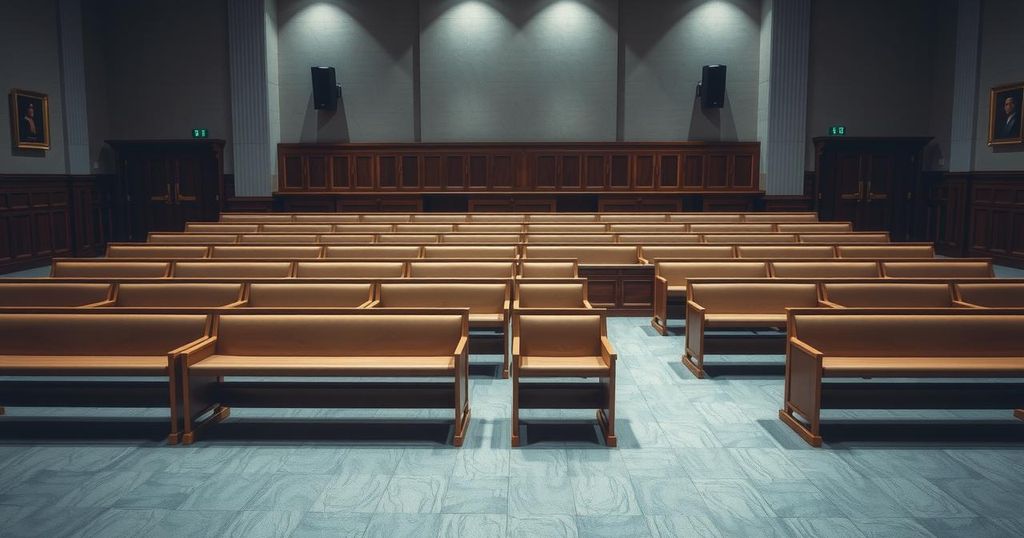The trial of approximately 40 prominent Tunisian opposition figures accused of national security offences has initiated, with defence lawyers and family members criticizing the case as politically motivated. Charges could lead to severe penalties, and concerns have been raised about the trial’s fairness, access to case files, and judicial integrity. Public dissent against President Kais Saied has escalated as advocates call for civil liberties and rights protections.
The mass trial of prominent Tunisian opposition figures has commenced, attracting significant condemnation from their lawyers and relatives who argue the proceedings are politically motivated. Approximately 40 high-profile defendants, including activists, politicians, and media personalities critical of President Kais Saied, face serious charges such as plotting against state security and membership in a terrorist group, which could result in severe penalties, including capital punishment.
In the courtroom, family members of the accused expressed their discontent by chanting “freedom”, alleging that the judiciary is acting under government directives. Abdelaziz Essid, one of the defence lawyers, criticized the situation, labeling the case as an “absurdity” and describing the trial as a mockery with abusive charges, according to Human Rights Watch. The hearing was subsequently adjourned for the court to consider the defence’s requests, including the physical presence of detained defendants.
Notably named in the trial are several influential political figures such as Jawhar Ben Mbarek and Ennahdha leader Abdelhamid Jelassi, among others. Advocates for the defence have raised concerns about the fairness of the trial, particularly with regards to the absence of some defendants who were not allowed to attend in person. Dalila Msaddek, a member of the defence committee, expressed concerns that sentences may have been pre-determined, deeming the case as hollow and based on false evidence.
The accusations against the defendants include alleged communications with foreign diplomats. Some individuals were arrested in February 2023, following Saied’s condemnation of them as “terrorists”, while others are currently at liberty or have fled abroad. Since his election in 2019, Saied has faced criticism for perceived threats to civil liberties following a substantial power consolidation in 2021.
Defence lawyers have repeatedly stated they lack access to complete case files, thereby undermining the trial’s integrity. Lawyer Samir Dilou further alleged that the trial is a government scheme targeting critics of the administration. The situation escalated following comments from National Salvation Front head Ahmed Nejib Chebbi, who noted that opposing the government is a legal right rather than a crime.
President Saied defended his position, asserting during a recent public interaction that he does not interfere in judicial matters. Critics have pointed to a broader pattern of arrests, including the case of Ennahdha leader Rached Ghannouchi, who received a lengthy prison sentence for purportedly plotting against state security. The United Nations has called for an end to arbitrary detentions and crackdowns on dissent across Tunisia, a sentiment that was met with strong rebuttal from the Tunisian foreign ministry.
In conclusion, the mass trial of opposition figures in Tunisia represents a critical juncture in the nation’s political landscape, highlighting significant allegations of political repression and judicial misconduct. The charges faced by the defendants have ignited widespread criticism, suggesting an ongoing struggle for civil liberties in a post-revolutionary Tunisia. As global organizations urge for the protection of human rights and freedoms, the situation remains precarious as Tunisia navigates its democratic path amid governmental pressures.
Original Source: www.romesentinel.com




